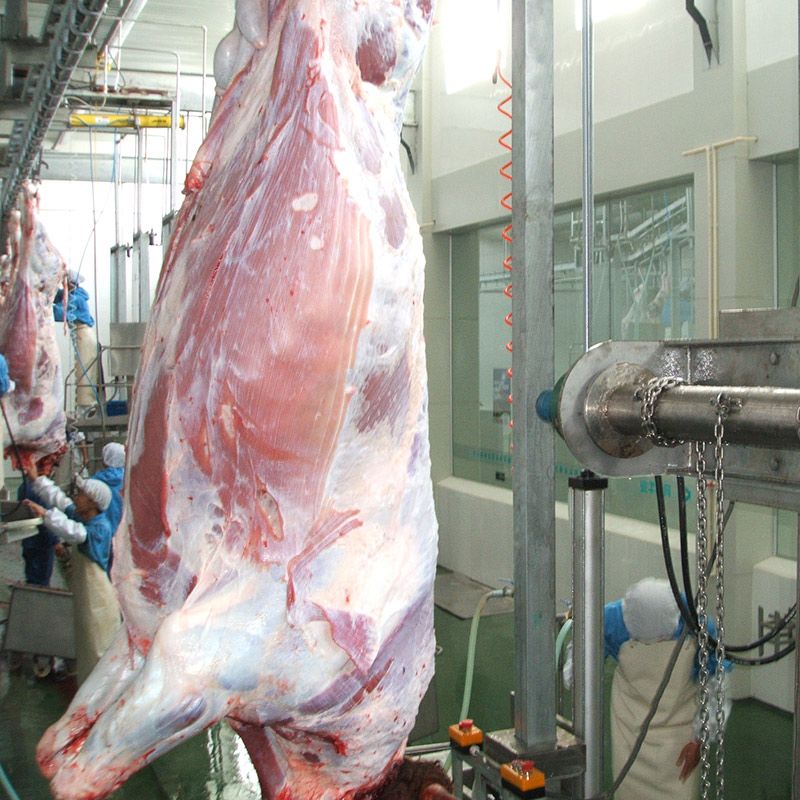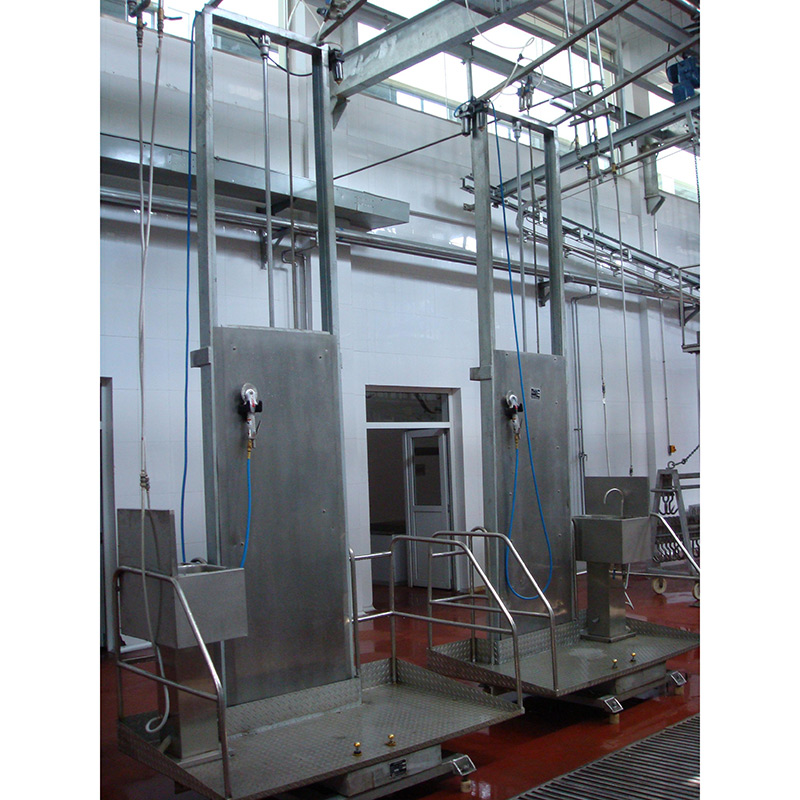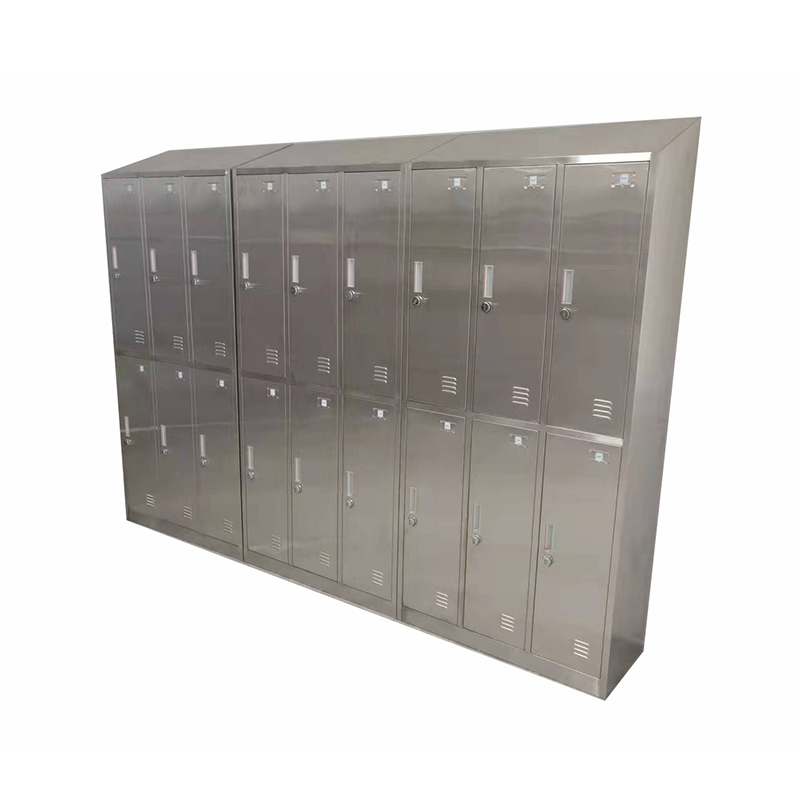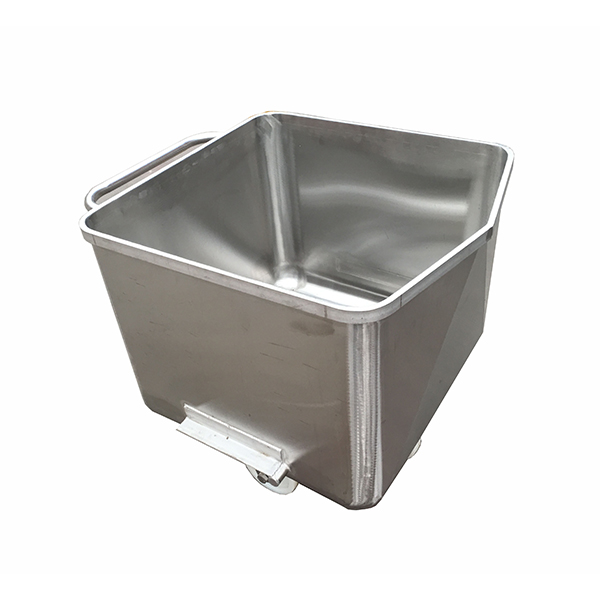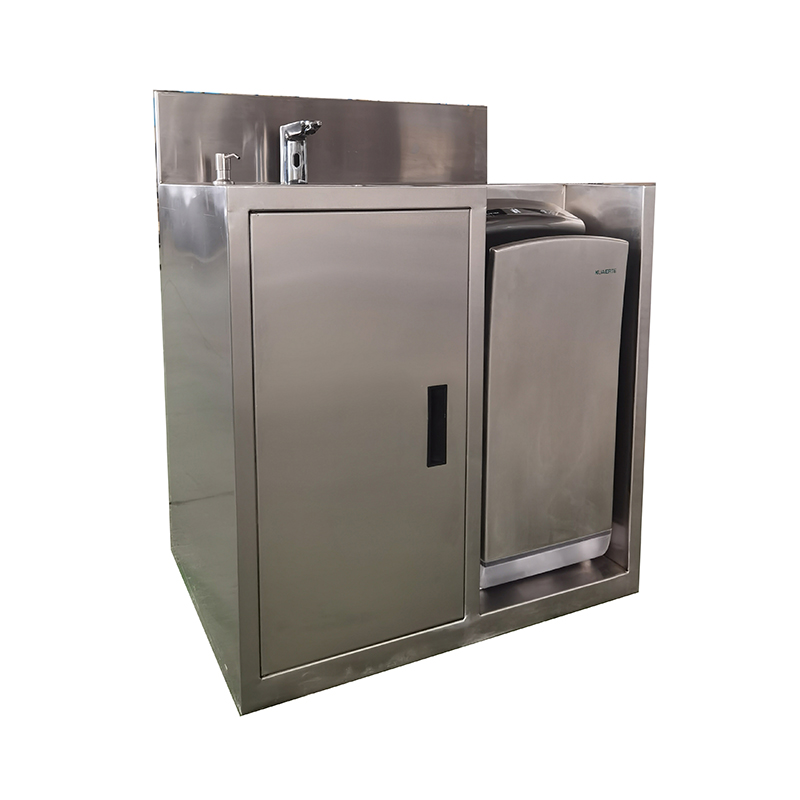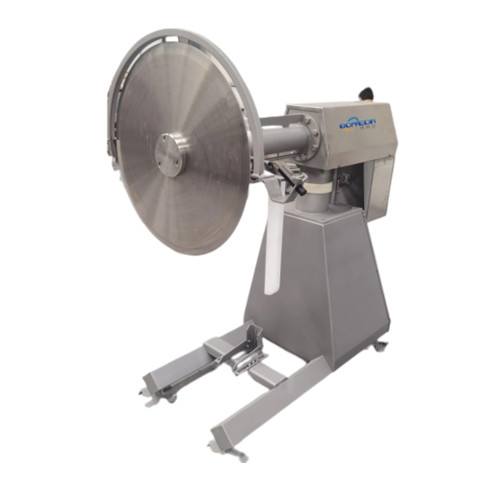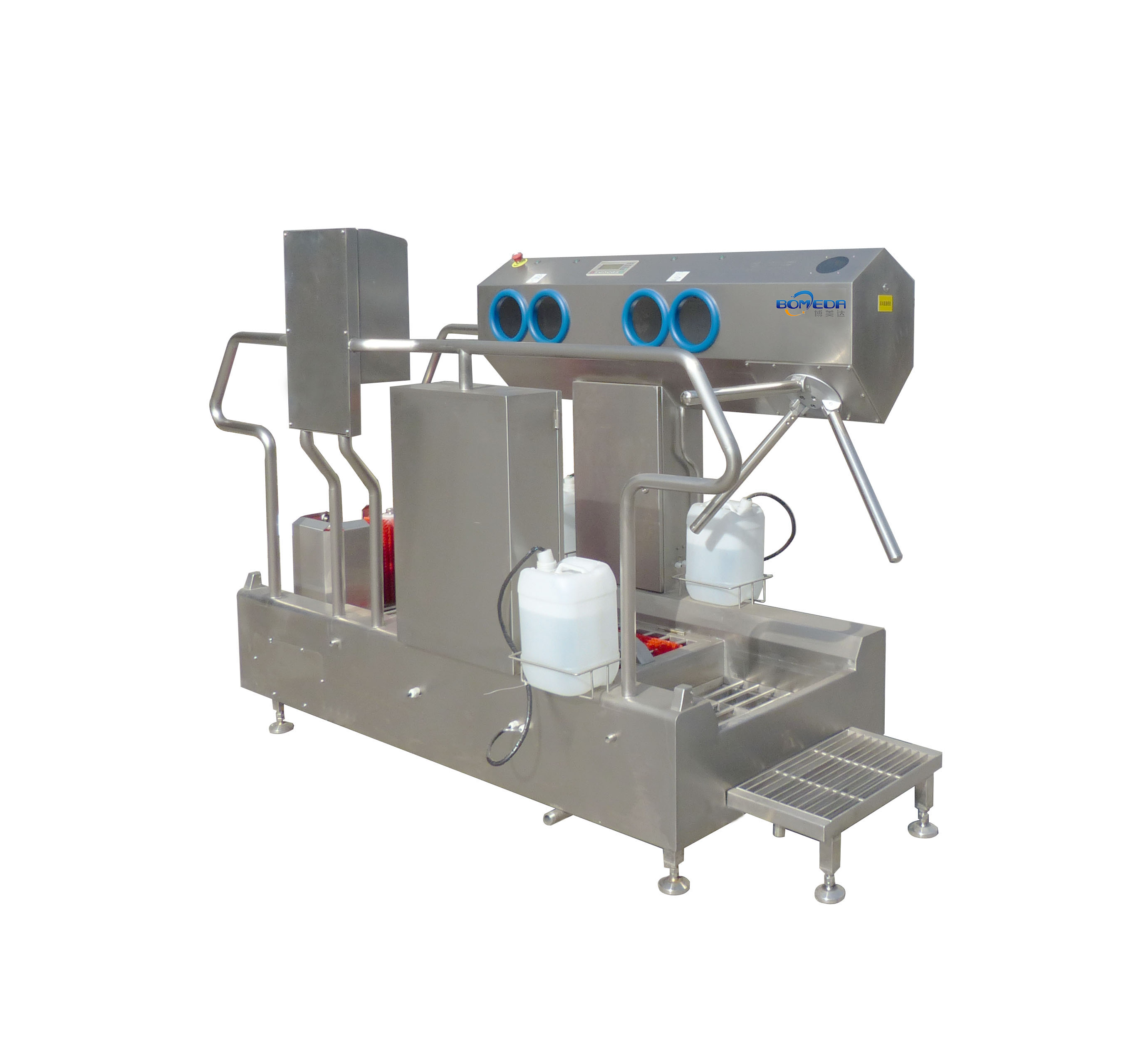Original Factory Beef Slaughter Machine Cattle Carcass Processing Automatic Convey Rail Cow Abattoir Equipment
The company upholds the philosophy of “Be No.1 in quality, be rooted on credit and trustworthiness for growth”, will continue to serve old and new customers from home and overseas whole-heatedly for Original Factory Beef Slaughter Machine Cattle Carcass Processing Automatic Convey Rail Cow Abattoir Equipment, Our organization has been devoting that “customer first” and committed to helping buyers expand their company, so that they become the Big Boss !
The company upholds the philosophy of “Be No.1 in quality, be rooted on credit and trustworthiness for growth”, will continue to serve old and new customers from home and overseas whole-heatedly for China Slaughtering Equipment and Slaughtering Machine, Our items have national accreditation requirements for qualified, high quality goods, affordable value, was welcomed by people today all over the world. Our products will continue to enhance within the order and look forward to cooperation with you, Should really any of these products and solutions be of curiosity to you, be sure to letus know. We are likely to be content to offer you a quotation up on receipt of your detailed needs.
What Is Cattle Slaughter Line?
Cattle slaughter line is the whole cattle slaughtering process, which includes pre-slaughter management, cattle slaughter,beef chilling and deboning. The slaughter line is a process that every slaughtered cow has to go through.
The Types Of Cattle Slaughter Lines
According to the scale, it is divided into large, medium and small cattle slaughtering line.
According to the daily production capacity, it can be divided into 20 heads / day, 50 heads / day, 100 heads / day, 200 heads / day cattle saughter line or more.
Cattle Slaughter Process Flow Chart
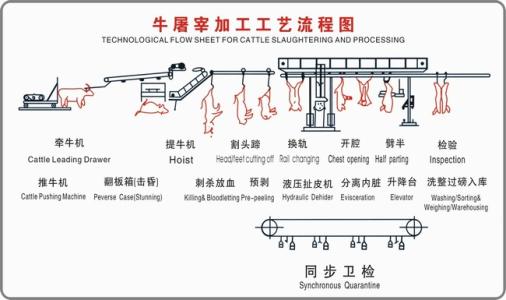
Cattle slaughter line
Healthy cattle enter holding pens→Stop eat/drink for 12-24h→Weighing→Shower before slaughter→Killing box→Stunning→Hoisting→killing→Bleeding(Time:5-6min)→Electrical stimulation→Fore hoof and Horns cutting/Pre-peeling→Rectum sealing→Hind hoof cutting/Rail transfer→Carcass dressing line→Pre-peeling→Cattle hide puller(The skins are transported to the skins temporary storage room through the air delivery system)→Head cutting(The cow head is hung on the hook of the red viscera / cow head quarantine conveyor to be inspected)→Esophagus Sealing→Chest opening→White viscera removal(Enter the tray of the white viscera quarantine conveyor to be inspected→①②)→Red viscera removal(The red viscera is hung on the hook of the red viscera/null head quarantine conveyor to be inspected→②③)→Splitting→Carcass inspection→Trimming→Weighing →Washing→Chilling (0-4℃)→Quartering→Deboning→Cutting→Weighing and packaging→Freeze or keep fresh→ take off the tray packing→Cold storage→Cut meat for sale.
① Qualified white viscera enter the white viscera room for processing. Stomach content are transported to the waste storage room about 50 meters outside the workshop through the air delivery system.
②Unqualified carcasses, red and white viscera were pulled out of the slaughtering workshop for high-temperature treatment.
③Qualified red viscera enter the red viscera room for processing.
Detail Explanation of Cattle Slaughter Process
1. Holding pens managing
(1) Before unloading, you should obtain a certificate of conformity issued by the animal epidemic prevention supervision agency, and observe the condition of the vehicle. If no abnormality is found, the unloading is allowed after the certificate and the goods are consistent.
(2) Count the number, drive healthy cattle into the slaughter pens by tapping or traction, and conduct ring management according to the health of the cattle. The area to be slaughtered is designed according to 3-4m2 per cow.
(3) Before the cattle are sent for slaughter, they should stop eating and rest for 24 hours in order to eliminate fatigue during transportation and restore their normal physiological state. The healthy and qualified cattle should stop drinking water 3 hours before slaughter.
(4) The cow should take a shower to wash off the dirt and microorganisms on the cow’s body. When showering, control the water pressure not to be too rushed, so as not to cause excessive tension in the cow.
(5). The cattle must be weighed before entering the cattle runaway. The cattle cannot be driven into the cattle runaway by violence. The violent drive will cause an emergency response and affect the quality of the beef. It is necessary to design a “lost” form to make the cattle conscious. Enter the slaughterhouse. The width of the cattle driving road is generally designed to be 900-1000mm.
2. Killing and Bleeding
(1) Bloodletting: After the cow enters the flap box of cattle slaughter line , the cow is stunned instantly by a stun method, and the cow body is released to lay on the bullpen for bleeding or hang on the bleeding rail for bleeding.
(2) When the cow enters the rail through the bloodletting hoist, the rail should be opened automatically, and the roller bloodletting sling should be hung on the track. The height of the bloodletting rail from the floor of the workshop is 5100mm. If it is a hand-push cattle slaughter line, the design slope of the hand-push line is 0.3-0.5%.
(3) The main processes completed on the bloodletting line: hanging, (assassing), draining blood, electrical stimulation, cutting the front legs and horns of the cow, sealing the anus, cutting the hind legs, etc. The draining time is generally designed to be 5-6min.
3.Rail Changing and Pre-Peeling
(1) After cutting the hind leg of the cow, hook the hind leg with a roller hook, and after the hoist is lifted, release the other hind leg of the cow, and hook it on the carcass processing line with the hook. The height between the track of the carcass processing automatic conveyor line and the workshop floor is designed to be 4050mm.
(2) The bleeding shackles return to the upper hanging position of the cow through the rail of the return system.
(3) Pre-peeling the hind legs, chest, and front legs with a peeling knife.
4. Dehiding Operation (important step on Cattle Slaughter Line)
(1). The cow is automatically transported to the leather-wrapping station, and the two front legs of the cow are fixed on the corbel bracket with the corbel chain.
(2) The peeling roller of the peeling machine is hydraulically lifted to the position of the cow’s hind legs, and the pre-peeled cowhide is clamped with a cowhide clip, and pulled from the cow’s hind legs to the head. During the mechanical peeling process, both sides The operator stands on the single-column pneumatic lifting platform to perform repairs until the head skin is completely pulled.
(3) After the cowhide is pulled off, the peeling roller starts to reverse, and the cowhide is automatically put into the cowhide air delivery tank through the cowhide automatic unfastening chain.
(4) The pneumatic gate is closed, compressed air is filled into the cowhide air delivery tank, and the cowhide is transported to the cowhide temporary storage room through the air delivery pipe.
5. Carcass processing
(1) Carcass processing station: cutting cow’s head, piercing the esophagus, opening the chest, taking white internal organs, taking red internal organs, splitting in half, carcass inspection, carcass trimming, etc., are all completed on the carcass automatic processing conveyor.
(2) Cut off the cow head, put it on the cutting board of the cow head cleaning device, cut out the tongue of the cow, hang the cow head on the hook of the cow head cleaner, clean the cow head with a high-pressure water gun, and hang the cleaned cow head on the red internal organs/ Niutou is on the synchronous quarantine conveyor to be inspected.
(3) Use an esophageal ligator to tie up the cow’s esophagus to prevent the stomach from flowing down and contaminating the beef. Enter the secondary leg support device, the secondary leg supports the two hind legs of the cow from 500mm to 1000mm for the next process.
(4) Open the chest of the cow with a chest saw.
(5) Scrap the white internal organs from the chest of the cow, namely the intestines and belly. Drop the removed white viscera into the pneumatic white visceral chute below, and slide the white viscera through the chute into the David inspection tray of the disc-type white visceral quarantine conveyor for inspection. The pneumatic white viscera chute is then subjected to cold-hot- Cold water cleaning and disinfection.
(6) Take out the red internal organs, namely the heart, liver, and lungs. Hang the removed red viscera on the hooks of the red viscera/null head synchronous quarantine conveyor for inspection.
(7) Split the cow into two halves along the vertebrae of the spine with a belt splitting half saw. The split-half splash screen is designed in front of the split-half to prevent bone foam from splashing.
(8), trim the two parts of the cow inside and outside. The trimmed two parts are separated from the carcass automatic processing conveyor and enter the carcass weighing system for weighing.
6. Synchronous sanitation inspection
(1) Beef carcass, white viscera, red viscera and cow head are simultaneously transported to the inspection area for sampling and inspection through the quarantine conveyor.
(2) There are inspectors to inspect the carcass, and the suspected carcass enters the suspected carcass track through the pneumatic switch.
(3) The unqualified red viscera and bull’s head shall be taken off the hook and put into the closed car and pulled out of the slaughterhouse for processing.
(4) The unqualified white viscera are separated by a pneumatic white viscera separation device, poured into a closed car and pulled out of the slaughterhouse for processing.
(5) The hook of the red viscera/null head synchronous quarantine conveyor and the sanitary inspection plate of the disc-type white viscera quarantine conveyor automatically pass cold-hot-cold water cleaning and disinfection.
7. By-product processing(Maybe some countries will not use it on the cattle slaughter line)
(1) Qualified white viscera enters the white viscera processing room through the white viscera chute, pour the stomach contents in the belly and intestines into the air delivery tank, fill with compressed air, and transport the stomach contents through the air delivery pipe to the slaughter About 50 meters away from the workshop, tripe and louvers are scalded by a tripe washing machine.
(2) Qualified red viscera and bull heads are removed from the hooks of the red viscera / bull head synchronous quarantine conveyor, hung on the hooks of the red viscera cart and pushed into the red viscera room, cleaned and then put into the cold storage.
8. Beef Chilling
(1) Push the trimmed and rinsed dichotomy into the chilling room to “discharge acid”. The chilling process is the process of beef tenderization and maturation. The beef chilling is an important link in the slaughter and processing process of beef cattle. It is also an important part of producing high-end beef.
(2) Temperature control during chilling: 0-4℃, the chilling time is generally 60-72 hours. Depending on the breed and age of the cattle, the acid time of some meat steaks will be longer.
(3) Detect whether the acid discharge is mature, mainly to detect the pH value of the beef. When the pH value is in the range of 5.8-6.0, the beef discharge is mature.
(4) The height of the chilling rail from the floor of the acid discharge room is 3500-3600mm, the track distance: 900-1000mm, and the chilling room can hang 3 dichotomy per meter of track.
(5) The area design of the chilling room is related to the slaughter volume and slaughter method of beef cattle.
9. Beef Quartered (9 and 10 are not necessary for the cattle slaughter line, the company chooses according to its own situation)
(1) Push the matured beef to the quadrant station, and cut off the middle of the bisected body with a quadrant saw. The back leg part is lowered from the 3600mm track to the 2400mm track by the descending machine, and the front leg part passes The hoist is raised from a 1200mm track to a 2400mm track.
(2) The large-scale slaughter and processing plant designs a quadrant storage room. The distance between the quadrant track and the ground between the quadrants is 2400mm.
10. Deboning segmentation and packaging
(1) Hanging deboning: Push the modified quadrant to the deboning area, and hang the quadrant on the production line. The deboning staff puts the cut large pieces of meat on the segmentation conveyor and automatically transmits them to the segmentation staff. , And then divided into various parts of meat.
(2) Deboning the chopping board: Push the modified quadrant to the deboning area, and remove the quad from the production line and place it on the chopping board for deboning.
(3) After the cut meat is vacuum packaged, put it in the freezing tray and push it to the freezing room (-30℃) for freezing or to the finished product cooling room (0-4℃) to keep it fresh.
(4) Pack the frozen product pallets and store them in the refrigerator (-18℃).
(5) Temperature control of deboning and segmentation room: 10-15℃, temperature control of packaging room: below 10℃.
The cattle slaughter line has many concerns. The detailed content of the cattle slaughter line above can help you have a better understanding of the process of the cattle slaughter line process.
Details Picture
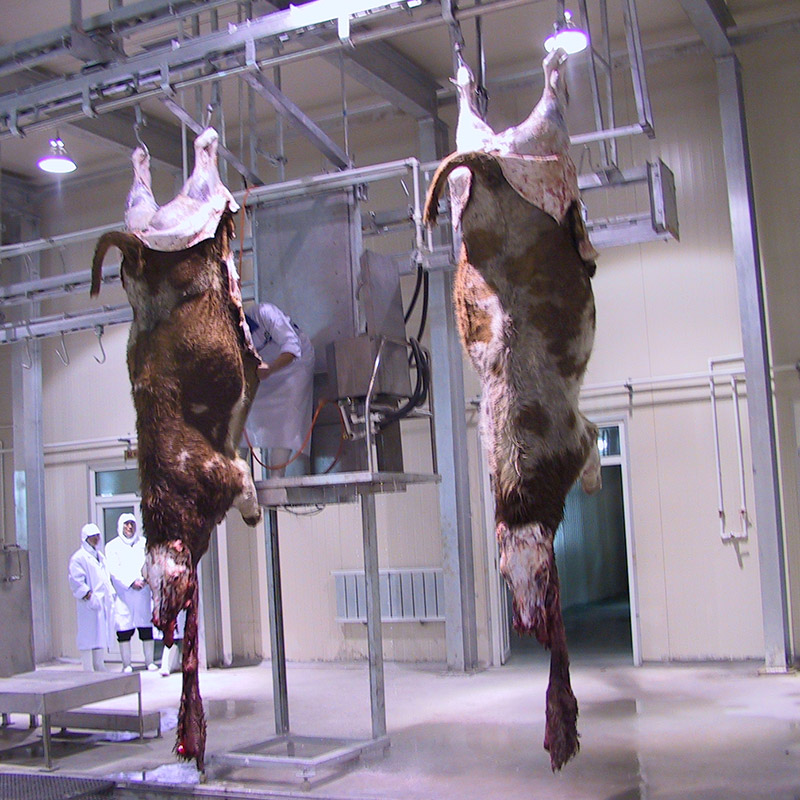
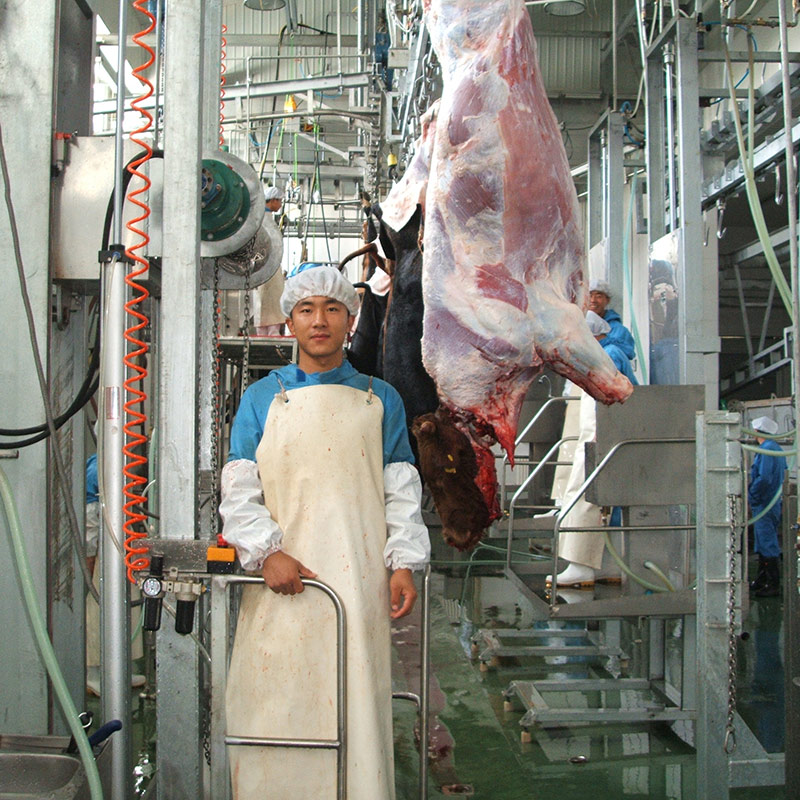
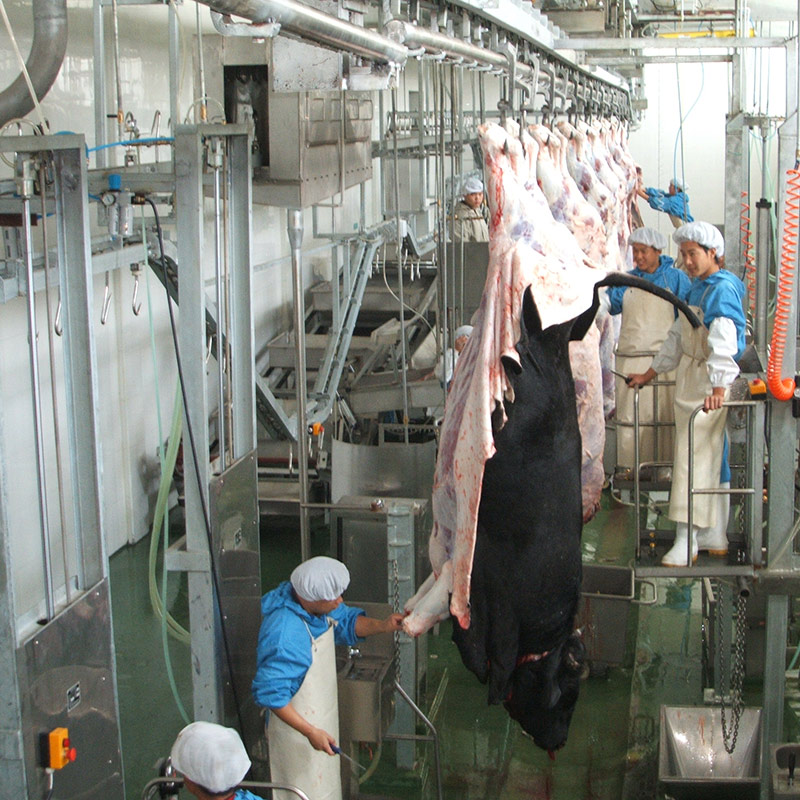
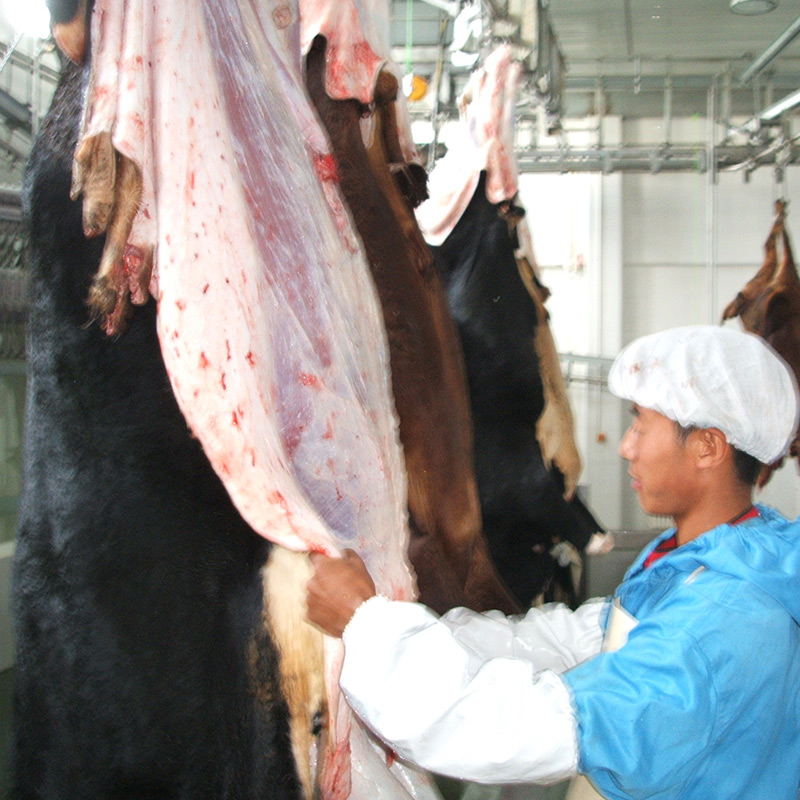 The company upholds the philosophy of “Be No.1 in quality, be rooted on credit and trustworthiness for growth”, will continue to serve old and new customers from home and overseas whole-heatedly for Original Factory Beef Slaughter Machine Cattle Carcass Processing Automatic Convey Rail Cow Abattoir Equipment, Our organization has been devoting that “customer first” and committed to helping buyers expand their company, so that they become the Big Boss !
The company upholds the philosophy of “Be No.1 in quality, be rooted on credit and trustworthiness for growth”, will continue to serve old and new customers from home and overseas whole-heatedly for Original Factory Beef Slaughter Machine Cattle Carcass Processing Automatic Convey Rail Cow Abattoir Equipment, Our organization has been devoting that “customer first” and committed to helping buyers expand their company, so that they become the Big Boss !
Original Factory China Slaughtering Equipment and Slaughtering Machine, Our items have national accreditation requirements for qualified, high quality goods, affordable value, was welcomed by people today all over the world. Our products will continue to enhance within the order and look forward to cooperation with you, Should really any of these products and solutions be of curiosity to you, be sure to letus know. We are likely to be content to offer you a quotation up on receipt of your detailed needs.

